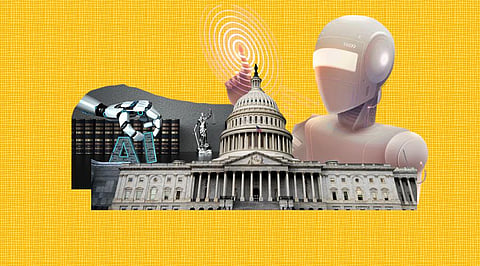

Digital privacy and particularly data privacy is one thing that is hard hit by the gadgets and technologies we engage with. US President Joe Biden, when first took oath in office he knew the impact of unsolicited data theft and the disparities AI systems bring in. Giving a push to his promise of taking steps towards an equitable society with assured civil rights and democratic values, on Tuesday White House Office of Science and Technology Policy released the "AI Bill of Rights", to usher in transparency and answerability of the AI algorithms that run the artificial intelligence systems. The Blueprint of the AI Bill of Rights was drafted after consulting companies like Microsoft, Palantir, human rights groups, AI auditing startups, and public opinion. "Too often, these tools are used to limit our opportunities and prevent our access to critical resources or services," said the White House in a statement.
The Artificial Intelligence Bill of Rights's five principles guide companies in designing, using, and deploying artificial intelligence. They are Safe and Effective Systems, Algorithmic Discrimination Protections, Data Privacy, Notice and Explanation, and Human Alternatives, Consideration, and Fallback. But by not making it constitutionally binding, experts say, the bill will only serve as a guideline that money-minded corporate biggies will choose to ignore. The bill is meant for Federal Government for governments, executives, and policymakers to understand its implications and have a critical perspective. Wired Magazine in a scathing report says, " Their tenets are usually directionally right, using words like transparency, explainability, and trustworthy, but they lack teeth and are too vague to make a difference in people's everyday lives."
While the EU has far progressed in bringing out an act in 2021 since initiating the conversation way back in 2018 – the US government only started the process a year ago. Taking baby steps into AI regulation OSTP introduced the vision of the future policy and in September it announced core principles for enhancing accountability and promoting healthy competition in the technology sector. It has also released a companion work "From Principles to Practice", to guide the government, NGOs, and public and private companies to implement operations that fall under the scope of the document. The effort to make a unified law is laudable although few states have already framed individual rules. For eg., Illinois implemented Biometric Information Privacy Act(BIPA) to ensure companies take people's consent for collecting biometric data. Many states have even passed laws banning using facial recognition software though currently they are not being strictly implemented. Notwithstanding the delay, however, some experts believe in its potential as a defining law in the realm of making AI algorithms responsible and equitable. "The OSTP Bill is clearly a starting point. That doesn't end the discussion over how the US implements human-centric and trustworthy AI. But it is a very good starting point to move the US to a place where it can carry forward on that commitment", says Marc Rotenberg, who heads the Center for AI and Digital Policy, a nonprofit that tracks AI policy.
Join our WhatsApp Channel to get the latest news, exclusives and videos on WhatsApp
_____________
Disclaimer: Analytics Insight does not provide financial advice or guidance. Also note that the cryptocurrencies mentioned/listed on the website could potentially be scams, i.e. designed to induce you to invest financial resources that may be lost forever and not be recoverable once investments are made. You are responsible for conducting your own research (DYOR) before making any investments. Read more here.
